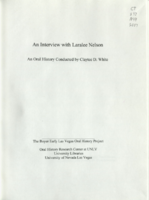Search the Special Collections and Archives Portal
Search Results

Transcript of interview with Laralee Nelson by Claytee White, April 20, 2010
Date
Archival Collection
Description
Laralee Nelson and her four sisters were born and raised in Provo, Utah. She was raised in a Mormon household, her parents worked at Brigham Young University and she attended BYU She was .nearly thirty years old when she moved to Las Vegas with her husband. The move was the first real move away from her Utah home base. She fondly recalls summers at an archaeological dig in Israel while studying for her undergraduate degree. But these were nothing compared to relocating to Las Vegas. Laralee's mother was a librarian at BYU and an obvious inspiration to her career choice. Once she arrived in Las Vegas, she applied for a cataloging position at UNLV. From 1982 to 2010, it was her first and only position. From that span of years, she witnessed monumental changes in the library. Changes in leadership, a move from the old Dickinson Library to the new Lied Library, and the impact of technology. Laralee's anecdotes, especially one about the professor with the red wagon and another about her father clearing a rocky path on a family trip, reveal core success of a library built to serve the university community.
Text

Transcript of interview with John Acres by Stefani Evans and Claytee White, July 11, 2017 & September 28, 2018
Date
Archival Collection
Description
Visionary John Acres likes to use his engineering background and computer expertise to solve problems. He has sold more companies that most people ever form—Electronic Data Technologies, Mikohn Gaming, and Acres Gaming—and he still owns the Acres 4.0 and Gen Seven companies. The 2016 Inductee to the American Gaming Association and the University of Nevada Las Vegas Gaming Hall of Fame reshaped the gaming industry by inventing electronic player tracking, progressive jackpot systems, and loyalty programs. Each innovation focused on customer service—"what would the customer think; what would they like; what would really get them excited; what would get them to come back"—and harkened back to lessons taught him by Norman Little, manager of Mr. Sy's Casino of Fun and one of the first people to hire a teenaged John Acres. In this interview, Acres bookends his remarkable career in gaming with the customer service philosophy of Norman Little as the basis, culminating with solutions to enable g
Text

Richard W. Bunker Interview, July 18, 2017, July 21, 2017, and September 28. 2017: transcript
Date
Archival Collection
Description
Fourth-generation Nevadan, Las Vegas native, and great grandson of Mormon pioneer Edward Bunker, Richard W. Bunker knows Southern Nevada as few others do. For example, when Richard Bunker speaks of water, he talks about his father's family leaving their home after the completion of Hoover Dam because their little town of St. Thomas was submerged in the rising waters of Lake Mead; he recalls swimming at the Old Ranch pool, the Springs, and the Mermaid pool; he shares stories of hiring Pat Mulroy, mentoring her, and encouraging her to apply to lead the Las Vegas Valley Water District; he mentions the Dunes and its two fresh-water wells, the Sanitation District and wastewater treatment. Few others have actively shaped Southern Nevada as Richard Bunker has through his lengthy career as a lobbyist (1973–2000); assistant manager for City of Las Vegas (1973–77); Clark County Manager (1977–79); member and Chair of the Nevada Gaming Control Board (1980–1982); executive director (1988-1990) and
Text

Transcript of interview with Frank Paul Silver by Barbara Tabach, August 29, 2017
Date
Archival Collection
Description
In 1973, Dr. Frank P. Silver ( 1934 - ) escaped the bitter weather of Philadelphia with his choice to relocate his OB/GYN medical practice to the small community of Boulder City. In his reflections of the move, Dr. Silver recalls his wife Elaine had little input in the initial move. However, with four children to manage, she soon made a home for the Silvers. Before the move, Dr. Silver was a lifelong resident of the Philadelphia area. He graduated from La Salle University, Jefferson University Medical School and did his residency at Nazareth Hospital – all in Philadelphia. In Southern Nevada he enjoyed the weather and the excitement of building his medical practice. He mentions occasional challenges of being Jewish in the 1970s in the area. He also talks about being a shareholder in the Crystal Palace, a Laughlin casino.
Text

Transcript of interview with Roberta Kane by Barbara Tabach, September 6, 2017 and May 22, 2018
Date
Archival Collection
Description
Roberta “Bobbie” Kane (1932 - ) is the first known Jewish child born in Las Vegas. Her parents, Sallie and Mike Gordon, were liquor stores owners and among the founders of the first Jewish congregation in Las Vegas. Bobbie’s childhood remembrances are as a young girl who was fully aware that “Friday nights were reserved for religious services. Saturdays were always reserved for gin rummy.” In the late 1940s, as a teenager at Las Vegas High School (and 1950 graduate), Bobbie recalls Las Vegas as a small town and a joyful place to grow up. She briefly attended University of Southern California before marrying and beginning her family. In time, life brought her back to live with her parents. She pursued a career working for the Desert Inn group of hotels and helped open the Stardust in 1957. She was mentored by Mark Swain, “a six foot-four hunk of a cowboy” who worked for Moe Dalitz. This experience included driving Mark’s pink Cadillac to pick up hotel guests. This provided her with a
Text

Transcript of interview with Mary and Bill Laub by Stefani Evans and Claytee White, September 15, 2017
Date
Archival Collection
Description
While offering anecdotes on Southwest Gas Company’s early years—including its flirtation with a nuclear bomb and owning a casino; its purchase of a Kingman, Arizona, ranch with an underground salt dome, and its involvement with the formation of Boyd Gaming—this oral history also reveals Bill Jr.’s role in applying his knowledge of natural gas infrastructure to promote extensive education about building codes, infrastructure, and engineered systems. In particular, Bill discusses EduCode, the internationally recognized, week-long building code institute held annually in Las Vegas that originally began more than twenty-five years ago and has since attracted worldwide participation. While Bill does not teach at the institute, he has helped organize the course since its inception and has been a consistent supporter.
Text

Transcript of interview with Norma and Gil Schwartz by Stefani Evans, September 22, 2017, October 4, 2017, & February 14, 2018
Date
Archival Collection
Description
It's been live, love, and laugh ever since we met. We've been married now thirty-three years. Even for a ninety-three-year-old man, thirty-three years is a long time. For Gil Schwartz, thirty-three years is nearly one-third of his life. The former real estate broker, who was raised in Rye, New York, learned the business by working with his father and then forming his own property management company in Manhattan. In 1959, with two children in tow, Gil moved to Las Vegas, where he soon took temporary quarters at Twin Lakes Lodge and he and his children learned to ride horses. In this interview, Schwartz recalls how horseback riding gave him an instant network of friends through working on the annual Helldorado Days and joining the Sheriff's Mounted Posse. He talks about Sahara Realty, the real estate brokerage he founded in 1964 and sold in 1983, and he shares his experiences 1967–68 in negotiating options to buy about one hundred parcels of unimproved land for Herb Nall, who represe
Text

Transcript of interview with Ellis Landau by Barbara Tabach, November 28, 2017
Date
Archival Collection
Description
In 1990, Las Vegas became home to Ellis Landau and his attorney wife, Yvette. They moved from Phoenix, Arizona when Ellis accepted a position as Executive Vice President and Chief Financial Officer with Boyd Gaming. The relocation also included a desire to become active in the local community. Temple Beth Sholom was one of their first connections. For Ellis the Jewish community of a newer city like Las Vegas differed immensely from his childhood upbringing in a more ethnic Jewish community outside Philadelphia. Nevertheless, Ellis soon became active on the Temple Beth Sholom board, and is a past Treasurer and President. The couple are among the founders of the Warsaw Memorial Garden at the synagogue. In 2006, Ellis was honored as Temple Beth Sholom’s “Man of the Year.” The Landaus have been significantly involved with other local organizations such as Nathan Adelson Hospice and the Las Vegas Philharmonic. Ellis’s dedication to the Anti-defamation League, both on a local and regional level, is a beacon of inspiration to others. The Landaus are sponsors of ADL’s “No Place for Hate” program. Ellis is a graduate of Brandeis University in economics and has a Masters of Business Administration from Columbia University School of Business. His former career steps include Ramada Inc. and U-Haul Corporation.
Text

Transcript of interview with Kim Bird & Pam Fogliasso by Claytee D. White, February 8, 2013
Date
Archival Collection
Description
Kim Bird's family moved to Las Vegas in 1955 when she was twelve years old. Pam Fogliasso arrived in 1954 with her family in 1954, when she was ten. Kim married and had a son and a daughter; she lives in Las Vegas. Pam married, had two children, and lives in Parumph, Nevada. Though Kim and Pam moved here in the mid-1950s, they had family members who had lived in Southern Nevada and worked on building Hoover Dam - Kim's grandfather and Pam's great-uncle. Both women remember growing up in a Las Vegas that was run by the mob and safe for teenagers; meeting friends in local hangouts such as the Blue Onion and attending sock hops, babysitting, and cruising down Fremont Street. They attended high school with black students but were also aware of the segregation that existed on the Strip. This interview focuses on Kim and Pam's experiences growing up in Las Vegas, and on their teenaged years attending Rancho High School.
Text

Transcript of interview with Millicent Rosen by Barbara Tabach, June 23, 2015
Date
Archival Collection
Description
Until her passing in 2017, Millicent (Siegel) Rosen was the living link to Benjamin “Bugsy” Siegel, one of Las Vegas’ most notorious links to the Jewish mob. A steadfastly independent woman herself, Millicent recalls Benjamin as a loving father to her and her younger sister. She is proud of his status as a Las Vegas visionary, though she affixes a footnote that the city of today might not be to his liking. She includes a few anecdotes about common names of the early days, including Meyer Lansky who walked her down the aisle when she married Jack Rosen. They had three children: Benjamin, Cindy, and Wendy. Millicent moved to Las Vegas to be with her daughter and her family in about 2000 and cherished her role as a grandmother. Always an artist at heart, Millicent once painted canvases for needlepoint and in 2015 promoted her clothing line.
Text
